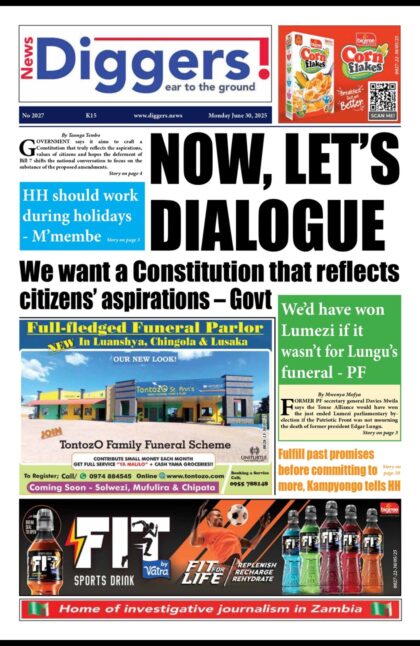ECONOMIST Trevor Hambayi says government should give an account of where the resources which the previous government borrowed went.
And Hambayi says there is nothing wrong with President Hakainde Hichilema requesting the Kingdom of Saudi Arabia to consider converting Zambia’s debt to that country into a grant.
In an interview, Monday, Hambayi noted that at the moment, Zambia was in a lot of debt but it was unknown how the money was spent by the previous government.
“Look, one other thing that I always note is that it is really important that the government gives us an account of where the resources we had borrowed have gone. Right now we have got this very big, huge debt as a country, we really don’t know where these resources went and how they were spent by the previous government. We need to try and resolve this and be accountable as to where the resources went,” he said.
And Hambayi said he doesn’t see anything wrong with President Hichilema requesting the Kingdom of Saudi Arabia to consider converting Zambia’s debt to that country into a grant.
“I don’t find anything wrong with the President asking them to do this, I think he has to try all means and ways to try and reduce on our debt liability. For the country that can give us a grant instead of a debt, or can convert our debt into a grant, those ones we must ask to support us to ensure that we get to a point where we can afford to make full use of our debt liability. There is nothing wrong with it, it is a standard bilateral agreement that is conducted between government and government. And usually, when it is being driven by the President, it carries more weight than when they have actually discussed with technocrats. It is not a very easy thing to do because the other party who is a bilateral government had already booked this on their debt position as a loan facility they had given to us and to convert it to a grant obviously, might take a bit of time,” he said.
“We are in a very desperate situation, remember the economic recovery that we are trying to have as a country is dependent much on having to deal with our debt position. In the last one and a half, the 18 months between November 2020 and now, we have defaulted on all our repayments which I think is more than US$1.2 billion in arrears. Now the key aspect is, firstly, if we have not been servicing our debt liabilities, our exchange rate should have been very comfortable in the essence that there is no pressure on the foreign exchange. But you find that that pressure is still there on the foreign exchange, we still get the Kwacha depreciating and we have seen volatility in the exchange rate, which means we are in a position that we do not have the resources to meet our obligations.”
He further said the IMF package was key to ensuring that the country had its debt restructured.
“Generally speaking, the first aspect is that as the country we default on our installment, which is having to pay our coupon payments. And since 2020, the country has not been paying its external debt liability and this has been on two fronts; the first one obviously was on the aspect that we are part of the G-20 initiative which was a Debt Service Suspension Initiative (DSSI). This is one that allowed us to suspend our payments while we negotiated our position because we were in a position where we couldn’t afford to do this. The second one was obviously because it created a conflict that we also had bilateral loans which were with mostly China and the Chinese banks,” said Hambayi.
“So in essence we have defaulted on all those ones, and right now to be able to resolve this issue is why we are pushing for an IMF package. That we do not have a credibility to negotiate with foreign entities in terms of having to restructure our debt and the IMF is going to support us to give us the credibility to be able to do this. So at the moment, the IMF has said we have got an IMF staff level agreement, the next stage is that we need to negotiate with our creditors on how we intend to make these payments with the support of the IMF. Until we have finished with these negotiations, there is very little we can do because we have already defaulted.”


















